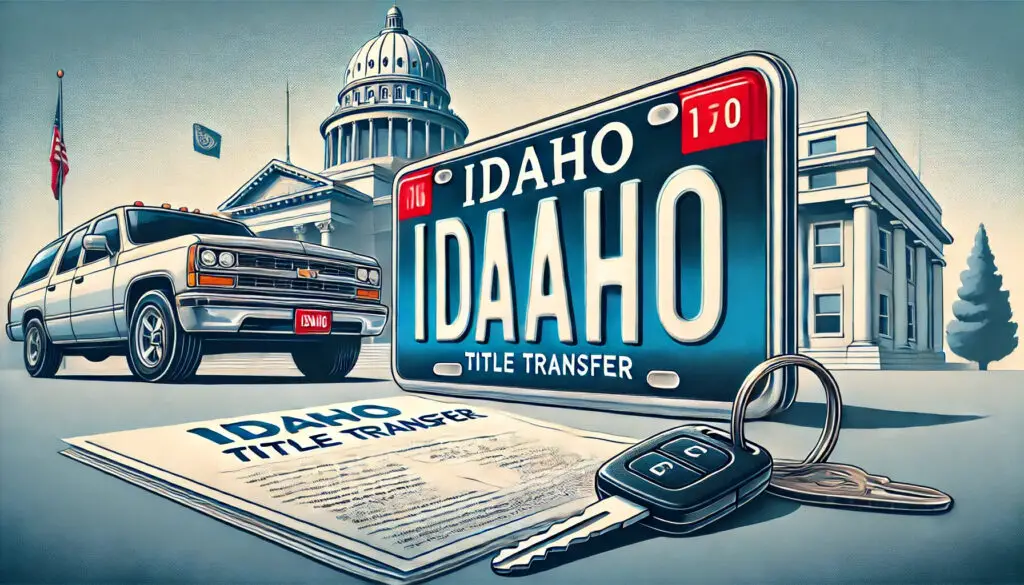Title transfer in Idaho is the process that legally transfers the ownership of a vehicle from one person to another. Whether you’re buying, selling, inheriting, or gifting a vehicle, this procedure ensures that the new owner is officially recorded as the holder of the vehicle title in the state of Idaho. The Idaho title transfer process is essential to comply with state laws, protect your legal rights, and ensure a smooth ownership transition.
In this comprehensive guide, we will walk you through every step of the Idaho title transfer process, key documents, fees, and special situations like inheritance, divorce, or gifting a vehicle.
What Is Title Transfer and Why Is It Important in Idaho?
A title transfer in Idaho is an official change of ownership for a vehicle. When ownership is transferred, the state recognizes the new owner’s legal right to the vehicle. This process is crucial for several reasons:
- Ensures proper registration and title documentation.
- Prevents legal disputes over ownership.
- Protects buyers from future claims on the vehicle.
- Helps maintain up-to-date records at the Idaho DMV.
Overview of the Idaho Title Transfer Process
The Idaho title transfer process requires the seller and buyer to complete several forms and submit necessary documentation to the Idaho Department of Motor Vehicles (DMV). The process involves providing proof of identity, residency, and vehicle ownership. The buyer is required to pay certain fees and taxes, while both parties must ensure that the title is signed properly to avoid any complications.
Understanding Idaho Title Transfer
What Is Title Transfer in Vehicle Ownership?
When you transfer the title of a vehicle, you are legally changing ownership. This involves both the buyer and the seller signing the title document. The buyer is then required to submit the signed title, proof of identity, and residency to the Idaho DMV, which issues the new title under the buyer’s name.
Why Title Transfer Is Crucial When Buying or Selling a Vehicle
The importance of title transfer when buying or selling a vehicle cannot be overstated. For the seller, transferring the title removes the responsibility and liability associated with the vehicle. For the buyer, it’s the legal confirmation that the vehicle is theirs, ensuring they can register it and operate it legally.
Common Situations Requiring Title Transfer in Idaho
There are several situations in which a title transfer is necessary:
- Vehicle Sale or Purchase: Both private-party and dealership transactions require title transfers.
- Inheritance: If a vehicle is inherited, a title transfer is required to transfer ownership to the inheritor.
- Divorce: In a divorce, the division of assets may include vehicle title transfers.
- Gifting or Donation: When a vehicle is gifted or donated, a title transfer is necessary to record the new owner.
Who Needs to Transfer a Title in Idaho?
Vehicle Buyers and Sellers
If you are buying or selling a vehicle, the title transfer is mandatory. The seller needs to sign the title over to the buyer, and the buyer must submit the title to the Idaho DMV for processing.
Inheritors of a Vehicle Title
If a vehicle is inherited, the title must be transferred into the name of the heir. Documentation, such as the will or proof of the estate, is required.
Title Transfers Due to Divorce
In divorce cases, ownership of the vehicle may need to be transferred to one spouse. A court order or legal documents may be required in these instances.
Title Transfers After Donation or Gift
If you’re gifting or donating a vehicle, you will need to transfer the title to the new owner. This process is similar to selling, but different forms may be needed depending on whether the transfer is a sale or gift.
Step-by-Step Guide to Idaho Title Transfer
Step 1: Gather Necessary Documents
Before initiating the title transfer, ensure that you have the following documents:
- Proof of Identity: A valid government-issued ID is required.
- Proof of Residency: A utility bill or lease agreement showing your Idaho address.
- Original Vehicle Title: The title document from the seller.
- Odometer Disclosure: Required if the vehicle is less than 10 years old to record the odometer reading.
Step 2: Complete the Title Transfer Form
The title transfer form must be filled out accurately to avoid delays. This form is available online or at any local DMV office. Key information to include is:
- Buyer and seller information.
- Vehicle details, including make, model, year, and VIN (Vehicle Identification Number).
- Odometer reading (if applicable).
Step 3: Pay the Title Transfer Fees
There are fees associated with transferring a title in Idaho, which must be paid at the time of submission. Fees may vary depending on whether the vehicle is registered or if it’s a late transfer.
Step 4: Submit Your Application at the DMV
Once all forms are completed and fees are paid, submit your title transfer application to the Idaho DMV. You can submit the application in person or online.
Step 5: Receive New Title and Registration
After processing, the DMV will issue a new title and registration under the buyer’s name. Expect to receive your new title in the mail within a few weeks.
Title Transfer Fees in Idaho
Standard Title Transfer Fees
The standard fee for a title transfer in Idaho varies depending on the vehicle type and the type of transfer. These fees typically range from $14 to $69.
Late Title Transfer Fees
If the title transfer is not completed within 30 days of the sale, a late fee will apply. This fee is an additional $10 or more, depending on the specifics of the transfer.
Special Title Transfer Situations in Idaho
Transferring a Title After a Vehicle Owner Dies
In the event of a vehicle owner’s death, the title must be transferred to the estate or heirs. Probate documents or a will may be required to complete this transfer.
Divorce and Title Transfer
In divorce cases, one spouse may retain ownership of a vehicle. A legal order from the court is typically required for the title transfer to proceed.
Gifting or Donating a Vehicle
Title transfer after a donation or gift requires both the donor and recipient to sign the title. Special forms for gifts may be necessary.
Classic or Antique Cars
Title transfers for classic or antique vehicles may involve additional paperwork to verify the vehicle’s age and condition.
Out-of-State Title Transfers
If you are transferring a vehicle into Idaho from another state, ensure that you bring the original out-of-state title and follow specific steps to register the vehicle in Idaho.
How Long Does Title Transfer Take in Idaho?
The title transfer process in Idaho typically takes between 10 to 15 business days. However, if there are issues with the submitted paperwork or missing documentation, the process may take longer.
Common Mistakes to Avoid in Idaho Title Transfers
- Failing to Sign the Title: Both parties must sign the title for the transfer to be valid.
- Not Completing the Odometer Disclosure: Ensure the odometer disclosure is completed for vehicles less than 10 years old.
- Delaying Title Transfer: Complete the transfer within 30 days to avoid late fees.
- Forgetting to Pay Fees: Double-check the fees required for the transfer and registration.
How to Check the Status of Your Title Transfer in Idaho
To check the status of your title transfer, visit the Idaho DMV’s website. You can track the progress of your application online. If you don’t receive your title within the expected timeframe, you can contact the DMV for assistance.
Frequently Asked Questions (FAQs)
- How do I transfer a car title in Idaho if I lost the original title?
- If you’ve lost the original title, you must apply for a duplicate title before transferring ownership.
- Can I transfer a title without the buyer being present in Idaho?
- Yes, you can transfer a title via mail or online if you have the correct documentation.
- What happens if I don’t transfer the title within 30 days?
- Failing to transfer the title within 30 days results in additional fees.
- Do I need an emissions test before transferring a title in Idaho?
- An emissions test is only required if the vehicle is registered in certain areas of Idaho.
- Can I transfer a title if the vehicle title is from another state?
- Yes, you can transfer an out-of-state title by following Idaho’s specific requirements for registration.
Conclusion
Transferring a title in Idaho is an important legal step that protects both the buyer and seller in vehicle transactions. By following the outlined steps and ensuring that all necessary documentation is provided, you can complete the title transfer process smoothly. Be sure to address any specific concerns related to special situations like divorce, inheritance, or gifting to avoid delays.
Key Takeaways:
- Ensure all documentation is complete and accurate.
- Pay the necessary fees promptly.
- Check the status of your title transfer regularly to avoid issues.
By understanding and following these procedures, you can confidently navigate the Idaho title transfer process with ease.











